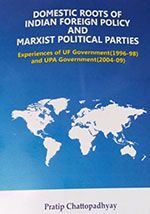As India’s influence in global politics increases, there has been a corresponding increase in the number of books on Indian foreign policy. Increasingly, one sees more books and articles based on India’s archives. However, the impact of India’s domestic politics on the formulation of foreign policy remains an under-researched area. Of the little work on it, there is even less work on the role of the Left parties in Indian foreign policy. Pratip Chattopadhyay’s work, which focuses specifically on the experiences of the United Front (UF) Government (1996-98) and the Congress-led United Progressive Alliance (UPA) Government (2004-2009), tries to address this gap in research.
Chattopadhyay’s book is divided into eight chapters, including the introduction and conclusion. The book tries to link James Rosenau’s pre-theories and the Marxist theory of class to show the importance of domestic compulsions in shaping foreign policy in the Indian context. The reasons for choosing the UF and UPA Governments are because the Left parties were either directly or indirectly part of these coalitions.

